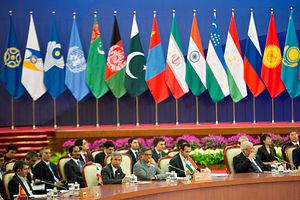The Shanghai Cooperation Organization (SCO), first founded by by the leaders of China, Russia, Kazakhstan, Kyrgyzstan, Tajikistan, and Uzbekistan in 2001, is in the middle of a quiet identity crisis. As I wrote earlier this year, the prospect of both India and Pakistan joining the group will considerably change the nature and “like-mindedness” of the grouping. It appears that now Afghanistan is throwing its hat into the SCO ring for full membership. Dmitry Mezentsev, the general secretary of the SCO, confirmed on Friday that Afghanistan is seeking to become a full member of the organization, Afghanistan’s Pajhwok news agency reports.
“The Afghan authorities have recently applied to the president of the country chairing the SCO requesting for its full membership in the Organization,” Mezentsev noted. He added that Afghanistan has long been on the SCO’s agenda. For SCO member states–certainly China and Russia–the security situation in Afghanistan is of central importance to overall regional security. Though the SCO has a mostly muted political and economic agenda, it serves as a regional coordination forum for counter-terrorism. The SCO’s Regional Anti-Terrorist Structure (RATS) oversees member state cooperation against what the organization describes as the “three evils”: separatism, extremism, and terrorism. “Cooperation with Afghanistan must be built not only on combating terrorism or drug trafficking but also in the economic, cultural and humanitarian spheres,” Mezentsev added.
Afghanistan received observer status at the SCO in 2012 and, before this week, was the sole SCO observer state that hadn’t taken any real steps toward accession. Afghanistan, as a member of the SCO, could serve as an important fulcrum for the organization’s regional security agenda. Indeed, while the accession of India and Pakistan could paralyze the organization’s security agenda, Kabul’s accession could make the SCO more relevant in Asia. This is doubly true if the United States and NATO end up sticking to their current plan of withdrawal from Afghanistan despite an uncertain security situation. As Richard Weitz noted earlier this year, the SCO’s “future relevance will be determined by its ability to effectively address the continuing economic and security problems of neighboring Afghanistan.” Beyond making the SCO more relevant, Afghanistan itself would have quite a bit to gain from having access to the burgeoning multilateral forum.

































